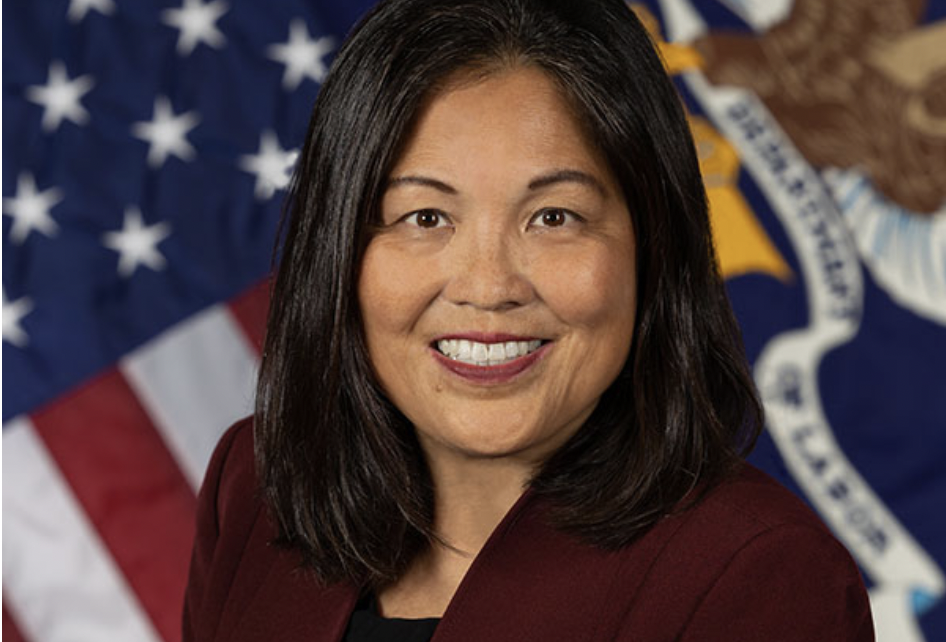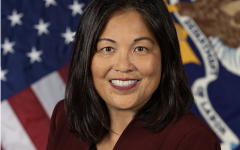
Deputy Secretary of Labor Julie A. Su. (Photo: dol.gov)
Congress: What Are You Up to, Julie?
Will Labor Department glom onto new NLRB regulation?
By Thomas Buckley, December 7, 2023 3:10 pm
At the end of October, the National Labor Relations Board (NLRB) issued an astonishingly overbroad rule as to what constitutes a joint employer.
Why does that matter and why would the House Committee on Education and the Workforce send a stern letter to Acting Secretary of Labor Julie Su asking if she has any plans to do anything similar?
Because the NLRB – which has oversight of collective bargaining particulars – rule was a big win for Big Labor and Su’s department could follow suit, creating an anti-business double team.
When it came to any business that could come to their attention, the NLRB could apply pressure to the company on the unionizing side and the Labor Department could trawl through every other labor-related regulation to create a second avenue of “we’re the government – you better do this.”
In short, the new rule expands what could be considered a joint employer relationship for union organizing – and other – purposes. The upshot being that a union – instead of having to go from store to store in a franchise situation can now simply focus its sights on the single main corporate outfit.
For example, McDonalds does not own your local restaurant– a franchisee does and operates it as a McDonalds, agrees to pay corporate a certain fee each month, and agrees to run it to certain standards and carry certain menu items, etc. but it remains an individual small business owned by the local person.
As an independent business, a union looking to organize its employees would have to do just that – organize each individual restaurant. This rule, however, makes the two entities joint employers, meaning the union could avoid going from shop to shop, franchisee to franchisee, and attempt to organize everyone who works at a McDonalds in one fell swoop.
Importantly, the rule goes far beyond franchisees and could impact practically every individual contractual relationship a company has. Take a hospital for example – it has what are known as “traveling nurses” on contract, it may contract out its food services, cleaning and maintenance services, etc. This rule impacts all of those relationships, in particular “traveling nurses” – RNs who move around the country plugging staffing shortages on a contract basis and who tend to make way more than regular employee RNs but may in fact “report” to them and definitely report to the hospital itself.
“The board’s rule on control is so amorphous, so broad, as to be essentially meaningless,” said Michael Lotito, co-chair of the Workplace Policy Institute. “It will allow NLRB staff, board members, and field offices to interpret it however they want. It’s another great gift to organized labor from the Biden Administration.”
And that is what has the committee worried. As noted above, if the Labor Department decides to mimic the NLRB, they could – using the joint employer rule as cover – “tag team” business targeted for organizing by Big Labor.
The letter points out that Su told the committee in June that doing anything about joint employer was not “on the agenda” of the department at that time.
But considering her close ties to labor, her anti-freelancer history (enforcing the draconian AB 5 here in California,) and the fact that she is serving as secretary in an “acting” position – a status that has already been challenged in court – that puts a cloud over every action she may take, the committee felt it needed distinct clarification on the matter.
“Throughout the hearing you repeatedly said a new joint employer standard was not on DOL’s agenda. However, you did not commit that DOL would not engage in rulemaking on joint employers,” wrote committee chair Rep. Virginia Foxx (R-NC). “Your failure to provide a commitment was noted, even when Committee members pressed you for an answer. This letter serves as a “checkup” and provides an opportunity for you to clarify DOL’s position on issuing a joint employer proposed rule. Given your failure to provide a concrete response at the hearing and given the NLRB’s recent rulemaking on determining joint employer status, we want to ensure that a joint employer rulemaking will not be on the regulatory agenda for the remainder of your tenure leading DOL.”
When contacted for comment earlier today, a Labor Department spokesperson noted (correctly) they had just received the letter from Foxx, adding that “(T)he Department is reviewing the letter and will follow up with the author through the appropriate channels.”
- Benefit Fraud Problems and Solutions - November 7, 2024
- A Little Exit Poll - November 5, 2024
- Tomorrow’s Headlines Today! - November 5, 2024



